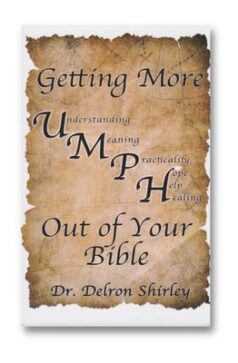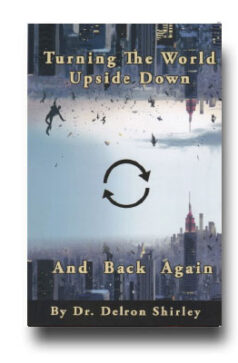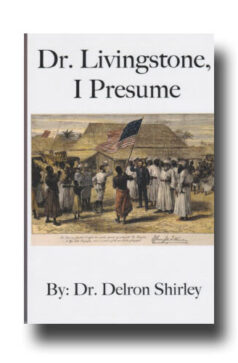Also, no matter how much we try to adjust it, if the thermostat is faulty, we won’t get any results from the furnace. In the spiritual realm, we can have defective hearing, which will short-circuit the effectiveness of the Word of God. There seem to be several basic hearing problems that plague the human race. The first one is that we simply can’t hear from God because we don’t belong to Him. Jesus addressed the religious Jews of His day plainly, “He that is of God heareth God’s words: ye therefore hear them not, because ye are not of God.” (John 8:47) The second condition is spelled out in Hebrews 5:11 where the recipients of the letter were addressed as being dull of hearing, “Of whom we have many things to say, and hard to be uttered, seeing ye are dull of hearing.” I’m sure that all of us have sat through lengthy lectures and seemingly-unending phone calls until we reached the “saturation point” where words seemed to begin to flow in one ear and out the other. We may be able to afford putting our brains in neutral on a few such occasions, but not when it comes to hearing the Word of God. Jesus warned us to be careful about not only what we hear but also about the very way we hear, “Take heed therefore how ye hear: for whosoever hath, to him shall be given; and whosoever hath not, from him shall be taken even that which he seemeth to have.” (Luke 8:18)
We have to be careful as to how we hear because humans have selective processing, the tendency to hear what we want to hear. I’ve seen this demonstrated time and time again as I’ve had students giving reviews of the class that I had just taught. It never ceases to amaze me how so many students hear so many things that I never said in the lectures. Their minds were programed to one frequency and they could only hear that particular message no matter what was actually said in the class. Perhaps this is the reason that the New Testament repeats the command, “He that hath an ear let him hear,” at least fifteen times. God gave us spiritual ears to hear what He is saying to the churches, but it is up to us to keep them tuned in and sensitive to His voice. In the parable of the sower, Jesus demonstrated that the Word of God could be sown into unproductive fields with no lasting result or that it could fall into fertile soil and produce an abundant harvest. Interestingly enough, He concludes His remarks with one of the admonitions concerning having listening ears, implying that the ear is the key to having the productive soil for the Word of God. In other words, the ear can be the thermostat that raises the temperature of the heart! (Luke 8:8)
A missionary friend of mine in the Dominican Republic had a problem with the portable generator he needed for a crusade he was doing. When none of the local mechanics could figure out what was wrong with the machine, my friend resorted to calling a friend of his on the cell phone. By simply listening over the phone to the sound that the generator was making, the mechanic was able to diagnose the problem with the generator and explain to the missionary what needed to be done to get it working properly. Now that’s what I call an attentive ear! God is looking for people with that same kind of spiritual hearing. That’s why He insisted to each of the seven churches in Revelation that anyone who has an ear should hear what the Spirit is saying. In addition, He gave us that same admonition at least nine times during His earthly ministry. (Matthew 11:15, 13:9, 43; Mark 4:9, 23, 7:16, 8:18; Luke 8:8, 14:35)
James warned us that we must not be forgetful hearers (James 1:25) who hear but not with an attentive ear that causes us to remember and act upon His instructions. In verse twenty-two, James explained that the root cause of such hearing problems lies not in our ears themselves but in the fact that we deceive ourselves – a malady that Jeremiah described as being a condition of the heart. (Jeremiah 17:9) James also made a parallel statement when he equated heart deception with an unbridled tongue. (James 1:26) He made another intriguing comment concerning wicked men, saying that they nourish their hearts as in the day of slaughter. (James 5:5) Many translations render this phrase to fatten the heart, but a couple make it even more graphic: “indulged your fancies” (Twentieth Century New Testament) and “stupefied yourselves with gross feeding” (Weymouth’s New Testament). So, what is the bottom line? Our human inclination is to be so self-absorbed that we can’t control our lips or our ears. We can be so self-focused that we simply can’t force ourselves to talk about the things of God or listen purposefully when He tries to talk to us.
The third hindrance to hearing the Word of God is that sometimes we simply don’t want to hear it! Let’s look at the story of the giving of the Ten Commandments in Exodus chapter twenty. Verse one plainly states that God orally spoke the Decalogue in the hearing of the entire camp of Israel. However, if we continue the story as it is recorded further on in the chapter, we will see that the people begged Moses to become an intermediary between them and God. They did not want to continue hearing directly from the very mouth of God. Instead, they devised a plan wherein Moses would hear the direct voice of God and then communicate His messages to them second-hand. They simply did not want the responsibility of hearing directly from God. I assume that they – just as we often tend to be – were more comfortable with a second-hand gospel because they knew that there might be a margin of error if it passed through a human channel, giving then an excuse for continuing in their unrighteousness. On the other hand, if they heard from the divine source directly, they would be without an excuse.
And all the people saw the thunderings, and the lightnings, and the noise of the trumpet, and the mountain smoking: and when the people saw it, they removed, and stood afar off. And they said unto Moses, Speak thou with us, and we will hear: but let not God speak with us, lest we die. And Moses said unto the people, Fear not: for God is come to prove you, and that his fear may be before your faces, that ye sin not. And the people stood afar off, and Moses drew near unto the thick darkness where God was. And the LORD said unto Moses, Thus thou shalt say unto the children of Israel, Ye have seen that I have talked with you from heaven. (Exodus 20:18-22; also see Deuteronomy 5:22-27 and 18:16)
The fourth complication is that we often can’t recognize God’s voice when He speaks to us. The lad Samuel had this difficulty when God first spoke to him. In the third chapter of I Samuel we find the story of how the Lord called him three times before he finally recognized that it was God Himself calling rather than his mentor Eli. However, if we read the rest of the story, we will see that Samuel subsequently developed an exceptionally clear ability to recognize the voice of the Lord. He became known as a “seer” because he could hear the whisperings of God concerning even the most secret of divine mysteries. In fact, the people of the region actually developed a fear of him, always cognizant that he might “read their mail” and expose the “skeletons in their closets” or reveal the “dust that they had swept under the carpet.”
As in the case with the people of Samuel’s day who were afraid that he might reveal their transgressions and shortcomings, the fifth reason why we cannot hear the voice of God is because we are simply afraid. This has been a common problem since “day one.” It was fear that drove Adam and Eve into hiding and away from their daily time of fellowship and conversation with God. (Genesis 3:8-10)
The sixth problem we have in not being able to hear the Lord is that we often do not give diligence to what we hear. In Exodus 15:26, the Lord, speaking concerning our health and healing, said that we must diligently hearken to His voice and give ear to His commandments in order to partake of His divine provision. While Deuteronomy chapter fifteen speaks of release from financial and physical bondage, verse five limits these provisions to only those who will carefully hearken unto the voice of the Lord and observe all His commandments. The twenty-eighth chapter of Deuteronomy contains an oft-quoted roster of blessings, but we must realize that the opening two verses limit these benefits only to those who hearken diligently unto the voice of the Lord and that verse fifteen turns all the blessings into curses for those who will not hearken unto His voice and observe all His commandments and statutes. For just a minute, let’s think on totally natural terms. Suppose you ask someone for directions to a specific place. Imagine that the instructions are a bit complicated with several turns, some to the left and some to the right. If you listen with only a casual ear, you will likely make the first turn with no difficulty and possibly take the second turn correctly; however, by the time you are at the third crossroad, you will be confused as to which way to turn. You’ll probably be totally lost before reaching the fourth road. Unfortunately, we are all too satisfied turning a nonchalant ear to God and, therefore, missing the precise plan He wants to lay out for our lives. Think of the detail that God gave Moses when He laid out the plans for the Old Testament Tabernacle; it took seven full chapters of Exodus (chapters 25-31) to spell out the pattern for the structure and the priestly order. But, more importantly, notice the preciseness with which Moses followed each detail when he implemented the blueprint. (chapters 36-40) The reward for this attention to detail was an invasion of the presence of the Lord so overwhelming that Moses was not even able to enter the Tabernacle. (Exodus 40:34-35)
We must learn that God is not in the habit of giving suggestions; rather, He gives direct commands that He expects to be followed explicitly. However, we will never be able to follow them in minute detail unless we learn to listen with diligence. I remember being in a service when a prophetic word came forth in which the Spirit reiterated three times that the Lord is God and that His people should kneel before Him in worship. As soon as the prophecy had ended, the moderator of the meeting took the podium, “We’ve all heard the Holy Spirit’s admonition, so let’s stand up and praise the Lord.” Fortunately, I was in a position of leadership within the group so that it was not out of order for me to step up and correct the moderator by reminding the people that the Holy Spirit had directed us to kneel – not stand – and to worship – not praise. No matter how sincere he may have been, he was wrong and would have led the people astray because he did not hearken diligently to the voice of the Lord in the prophetic message.
In his reflections as he came to the conclusion of his afflictions, Job remarked, “I have heard of thee by the hearing of the ear: but now mine eye seeth thee.” (Job 42:5) These remarks open to us a new vista of understanding concerning another one of our abilities to know God. When we hear, we hear the Word of the Lord; but if we look, we can actually see the Lord Himself! Tragically, there are many hindrances that keep us from actually seeing Him as we need to. Like Adam in the garden, we may simply not want to see Him. (Genesis. 3:10) Or, like Isaiah in his encounter with God that awakened him to the wickedness that poured from his lips, we are afraid that seeing God may sentence us to judgment for our unrighteousness. (Isaiah 6:5) Perhaps we are like Manoah and his wife who feared that such a divine encounter would take their very lives. (Judges 13:22)
The more common malady, however, is the simple fact that all of us are blind to one degree or another. Many of us have taken color blindness tests where numbers are arranged in patterns of similarly colored dots. Depending upon the degree of color blindness we suffer, we will be able to pick out the hidden numbers on some of the pseudo-isochromatic plates but not be able to distinguish the pattern on others. In my own personal case, I have a rather marked degree of color blindness – so much so that my eye doctor once asked me if I had trouble telling the red and green lights apart on a traffic signal. I have also had a few humorous situations occur when I have mistaken objects because I thought them to be a different color, such as the time my wife sent me to pick up her green suitcase. As far as I could tell, all her suitcases are black; therefore, I never figured out which one she wanted.
We also suffer from faulty vision in that our minds actually overrule our eyes in many situations. For example, when we look at optical illusions, our minds make us see things in ways that are actually not true at all. A common illusion shows the drawing of two men on a pair of lines that converge beyond the sketches. Because the lines trick our eyes into thinking that the men are standing on a road that vanishes in the distance, one of the men looks like he is far bigger than the other one. Once we take away the lines, we can readily see that the two sketches are actually the same size.
This physical test for color blindness and the games we play with optical illusions can help give us a little insight into what Jesus meant when He explained that He taught in parables because some people had eyes to see and others did not. Just as we all look at the same dot patterns yet not all of us can see the hidden numbers, only the ones who have enlightened eyes will be able to see the message inside the story.
Therefore speak I to them in parables: because they seeing see not; and hearing they hear not, neither do they understand. And in them is fulfilled the prophecy of Esaias, which saith, By hearing ye shall hear, and shall not understand; and seeing ye shall see, and shall not perceive: For this people’s heart is waxed gross, and their ears are dull of hearing, and their eyes they have closed; lest at any time they should see with their eyes, and hear with their ears, and should understand with their heart, and should be converted, and I should heal them. But blessed are your eyes, for they see: and your ears, for they hear. (Matthew 13:3-16)
When Jesus made His statement about having eyes but not being able to see, He was quoting Isaiah 6:9-12, a significant Old Testament passage which is repeated at least four times in the New Testament. (Matthew 13:14, John 12:39, Acts 28:24-29, Romans 11:7-8) We can begin to understand why we are often unable to see even though we have seemingly perfectly good eyes by looking at a couple of clues Paul left us in his first letter to the Corinthians:
Which things also we speak, not in the words which man’s wisdom teacheth, but which the Holy Ghost teacheth; comparing spiritual things with spiritual. But the natural man receiveth not the things of the Spirit of God: for they are foolishness unto him: neither can he know them, because they are spiritually discerned. (I Corinthians 2:13, 14)
Notice the marked distinction between two contrasting worlds of reality – the natural and the spiritual. In the natural realm, we get human teaching; in the spiritual realm, we get teaching from the Holy Ghost. Paul goes on to say that those who are part of the natural order are unable to receive the truths of the spiritual realm – and, in fact, consider them to be foolishness. In the previous chapter of this same letter, Paul had already pointed out that the wisdom of the gospel is foolishness to the unregenerate. (I Corinthians 1:18) To them, it is foolishness to love your enemy or to give when you are in need. However, as he pointed out in the early part of chapter two, this same message which is foolish to the unsaved is wisdom to the redeemed – a wisdom that is hidden until we are enlightened by the Holy Spirit and, therefore, made perfect or mature.
And my speech and my preaching was not with enticing words of man’s wisdom, but in demonstration of the Spirit and of power: That your faith should not stand in the wisdom of men, but in the power of God. Howbeit we speak wisdom among them that are perfect: yet not the wisdom of this world, nor of the princes of this world, that come to nought: But we speak the wisdom of God in a mystery, even the hidden wisdom, which God ordained before the world unto our glory: Which none of the princes of this world knew: for had they known it, they would not have crucified the Lord of glory. But as it is written, Eye hath not seen, nor ear heard, neither have entered into the heart of man, the things which God hath prepared for them that love him. But God hath revealed them unto us by his Spirit: for the Spirit searcheth all things, yea, the deep things of God. (I Corinthians 2:4-10)
In his second epistle to this same church, Paul gave two reasons why we have eye problems. The first cause is that our eyes are blinded and the gospel is hidden from us by the devil.
But if our gospel be hid, it is hid to them that are lost: In whom the god of this world hath blinded the minds of them which believe not, lest the light of the glorious gospel of Christ, who is the image of God, should shine unto them. (II Corinthians 4:3-4)
Remember Nicodemus’ clandestine interview with Jesus? He wanted to know the secrets of the kingdom of God, and he was shocked to learn that it is impossible to even see the divine kingdom without being born again. (John 3:3) Nicodemus did not understand natural – much less spiritual – things. The god of this world has done such a good job of blinding the eyes of his subjects that they cannot see the kingdom that is presently among them. (Luke 11:20)
The second reason the apostle listed is even more tragic: we have voluntarily put a veil over our eyes. It is one thing to be blinded by an antagonistic force, but it is a totally different matter to willingly blindfold oneself in order to avoid the illuminating light of God. In Exodus chapter thirty-four, we read the story of how the people of Israel asked Moses to place a veil over his face to filter out the blinding glow on his countenance when he descended from his mountaintop sojourn with God. Paul explains the spiritual ramifications of their request.
And not as Moses, which put a veil over his face, that the children of Israel could not stedfastly look to the end of that which is abolished: But their minds were blinded: for until this day remaineth the same veil untaken away in the reading of the old testament; which veil is done away in Christ. But even unto this day, when Moses is read, the veil is upon their heart. Nevertheless when it shall turn to the Lord, the veil shall be taken away. Now the Lord is that Spirit: and where the Spirit of the Lord is, there is liberty. But we all, with open face beholding as in a glass the glory of the Lord, are changed into the same image from glory to glory, even as by the Spirit of the Lord. (II Corinthians 3:13-18)
God not only shows us the condition and its cause, He also reveals the cure. In His very first sermon, Jesus declared that He was anointed to give sight to the blind (Luke 4:18), and His ministry proved that He did, in that many blind received their sight – a miraculous ministry that continued under the hands of the disciples after Jesus’ ascension to heaven. (Matthew 9:27, 11:5, 12:22, 15:30, 20:30, 21:14; Mark 8:22, 10:46; Luke 7:21, 14:13, 18:35, 24:11; John 5:3, 9:1; Acts 9:12) In His message to the seven churches of Revelation, the Risen Lord confronted the Laodicean church because they saw themselves as healthy, wealthy, and wise. Jesus, on the other hand, recognized them as needing eye salve to correct their blindness. (Revelation 3:18) The context of His message to the church reveals that this healing is actually repentance – the only cure for both blindness caused by the diabolic work of our enemy and the self-induced blindness resulting from our own willful actions!
If the first step to the remedy is repentance, the subsequent step must be to use what vision we have been given. Remember that Jesus said that His reasoning for teaching in parables was because some were not given the ability to see. To the unregenerate Pharisees, He gave few parables; instead, He pointedly told them to repent. (Matthew 4:17; Mark 1:15; Luke 13:3, 13:5) It was to the disciples who were beginning to see properly that He addressed the parables and even agreed to give some explanation of them. When Jesus began to explain the parable of the sower to these disciples, He added that the ones who had such ability would be given even more. (Matthew 13:12) They were the fertile soil in which just one seed of the gospel could germinate and produce thirty, sixty, or even one hundred revelations. In a subsequent discourse, Jesus emphasized the point.
For unto every one that hath shall be given, and he shall have abundance: but from him that hath not shall be taken away even that which he hath. (Matthew 25:29)
Our ability to have spiritual insight will increase if we put it to use. Yogi Berra is quoted as having said, “You can observe a lot by looking.” Although he was not a theologian, he seemed to understand a truth that is demonstrated in the Bible. In Acts chapter three, we read the story about the first miracle healing through the church after the Lord’s ascension. It is interesting to note the various verbs used to describe the action of seeing. In verse three, the lame man is referred to as “seeing” Peter and John as they neared the temple. The next verse says that Peter “fastening his eyes” on the invalid, commanded that he “look on” the apostles. Notice the progression in the intensity of the verbs. When the lame man was only seeing, he had no spiritual insight and remained subject to his crippling condition. When the apostle fastened his eyes on the beggar, he focused his attention in a way that he had never done before. It is certain that Peter had noticed this man many times as he had gone in and out of the temple over the years; however, that day was different – there was a purposeful awareness that had never been there before. Finally, the afflicted man was directed to look – an action verb conveying purpose and expectant anticipation. That look of faith brought the man out of his physical dimension into the spiritual reality where he was able to receive his miracle. The author of the book of Hebrews also directs us to move from simply seeing the host of faithful witnesses to taking a purposeful focused look at Jesus, the author and finisher of our faith. (Hebrews 12:1-2) The implication is that deliberate and purposeful focusing of our spiritual attention can enhance our ability to see into the things of the spirit realm. Hebrews 5:14 declares that we can develop our senses – suggesting our hearing and our sight – by purposefully using them. If we have become blinded by deliberately placing a veil over our eyes, certainly we can undo that deficiency by concentrated focus.
But strong meat belongeth to them that are of full age, even those who by reason of use have their senses exercised to discern both good and evil. (Hebrews 5:14)
Paul even numbered himself among those who had limited clarity in vision when he testified in I Corinthians 13:12 that we (including himself) see through a “glass darkly.” But he also proclaimed that there was a day coming when we would “see face to face.” His point was that we can anticipate total revelation at the final resurrection; however, that resurrection power is already working in and through us today. (Ephesians 3:20) Additionally, we have the gifts of the Holy Spirit in our present lives as a foretaste of the power of that kingdom to come; therefore, we can expect to grow in clarity of vision as the Holy Spirit enlightens our present understanding. (I Corinthians 2:10) That is why Paul dedicated himself to praying for the church to receive the Holy Spirit’s impartation for spiritual vision.
I cease not to give thanks for you, making mention of you in my prayers; That the God of our Lord Jesus Christ, the Father of glory, may give unto you the spirit of wisdom and revelation in the knowledge of him: The eyes of your understanding being enlightened; that ye may know what is the hope of his calling, and what the riches of the glory of his inheritance in the saints. (Ephesians 1:16-18)
Many – if not most – believers suffer from Christian myopia, a nearsightedness that keeps us from looking at the full picture. Eighty-nine percent of American households own an average of three Bibles, yet fifty-two percent of Americans rarely or never read the Bible and only thirty-three percent say they read the Bible at least once a week. If we don’t read God’s Word, we will never be able to see the full truth that He wants to reveal to us. Even more significant is that those who do read the Bible often fail to allow the Bible to read them. To genuinely be healed of the spiritual blindness in our lives, we need to allow the light of the truth of the scripture to illuminate the obstacles that have blurred or obstructed our vision. (Matthew 7:3) Some people neglect spending time in study of the scriptures using the excuse that they can’t understand so much of it. The truth is that we shouldn’t be bothered by what we don’t understand in the Bible; rather, we should be concerned about what we do understand but have failed to apply to our lives. Once we begin to seriously read and apply the Word of God, we will discover that our vision gets more and more clear and accurate.
Another application of eye salve comes in a bottle labeled “forgiveness.” According to the beloved disciple John, our eyes can be blinded by walking in unforgiveness toward those around us.
He that saith he is in the light, and hateth his brother, is in darkness even until now. He that loveth his brother abideth in the light, and there is none occasion of stumbling in him. But he that hateth his brother is in darkness, and walketh in darkness, and knoweth not whither he goeth, because that darkness hath blinded his eyes. (I John 2:9-11)
One of the characters in the 1998 movie Patch Adams was a patient in a mental institution whose characteristic behavior was to get into the face of each person he met, hold two fingers in front of him, and demand, “How many fingers do you see?” Of course everyone thought that he was crazy because of this erratic behavior; however, Patch Adams eventually realized what the gentleman was up to. When Patch looked beyond the fingers and gazed at the man himself, the fingers were out of focus. Suddenly, he saw four – not two – fingers! The point of the object lesson was that we need to learn to look at the people whom God places in our lives rather than at the problems they may cause us. If we continue to focus on the problems, we will never see the people as God wants us to see them; we are blinded and walk in darkness.
When God wrote a personal memo on the wall of the Babylonian banquet hall, the devil and all his sorcerers demonstrated their lack of spiritual insight when they tried to read the words that were written plainly before their faces. (Daniel 5:5-29) Mene, mene, tekel, upharsin was a list of the coins in circulation in their empire. They could not go beyond the surface meaning of the names of their coinage. Certainly the Almighty was interested in more than just pocket change in His personal visit with the leaders of a great empire. Only Daniel – with his ability to understand what everyone else was simply looking at – was able to see that the name of each coin also had a second meaning. Just as our term “nickel” means a five-cent coin but also names a kind of metal, mene meant “to measure” in addition to naming their currency. Just as our term “quarter” means “one fourth” in addition to naming our twenty-five-cent coin, tekel had a second meaning of “to weigh.” Like our term “half” signifies the fifty-cent coin as well as meaning “fifty percent,” pharsin [u is the character for “and”] meant “to divide” as well as designating a monetary value. The terms mene and pharsin also seemed to suggest the rising empire of the Medes and Persians. All this revelation was “as plain as the handwriting on the wall,” but the magicians were blind to it.
The most tragic of all shortsightedness would be failing to see God when He is present and active in our lives.
Philip saith unto him, Lord, shew us the Father, and it sufficeth us. Jesus saith unto him, Have I been so long time with you, and yet hast thou not known me, Philip? he that hath seen me hath seen the Father; and how sayest thou then, Shew us the Father? (John 14:8-9)
As both a preventative and corrective measure for this kind of spiritual blindness, the scripture continually commands us to diligently and purposefully seek God. For those who seek the face of God, the most popular promise is in II Chronicles 7:14, which says that He hears from heaven and will forgive their sin and will heal their land. Psalm 24:4-6 says those who seek the Lord have clean hands and a pure heart and are in line for blessings and righteousness from their God.
Whether we will be able to see the Lord depends on the condition of our hearts. “Blessed are the pure in heart: for they shall see God.” (Matthew 5:8) Certainly, the pure in heart will see God in “the sweet by and by” of our eternal abode, but the truth is that we can begin to see Him in the “bitter here and now” of our temporal residence. Moses had this privilege (Exodus 33:11), but this was also extended to all the people of God.
And they will tell it to the inhabitants of this land: for they have heard that thou LORD art among this people, that thou LORD art seen face to face, and that thy cloud standeth over them, and that thou goest before them, by day time in a pillar of a cloud, and in a pillar of fire by night. (Numbers 14:14)
I know that it seems that we have had a long and rather tedious journey since the illustration of flipping on the light switch; however, that expedition has eventually brought us to the place where we have come face to face with God Himself. It is at that point – and only at that point – that all the vanity and emptiness of our minds can be replaced with the all-encompassing knowledge of God, giving us the opportunity to be transformed through the renewing of our hearts and minds into individuals who can leave a positive legacy.










